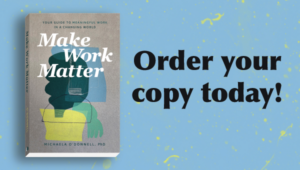Women Leaders are Meeting this Moment
Women Leaders are Meeting this Moment.
Let’s Hope it’s Not Costing Too Much.
Pre-pandemic, as part of my work, I would travel around to people to talk with them about the changing world of work. In fact, many times I would actually start whatever I was doing by saying, “The world of work has changed.” I would hear people sigh breaths of relief and watch as their shoulders loosened. Over time, I learned that these cues meant that I was naming something that people knew deep in their bones, but had not yet put words to.
These days, and because of my recently published book, Make Work Matter: Your Guide to Meaningful Work in a Changing World, I continue to spend a lot of my work hours helping people sort out their work in a changing world. But the conversations don’t play out like they used to. No one is relieved when I talk about change anymore. No one needs me to deliver this news. Mostly, as I experience them, people are exhausted and overwhelmed. And as people of faith, we’re looking to make sense of where God is and what God wants us to do.
In my conversations, I have observed distinctions in how women and men talk about work that matters in a changing world. And, while I’m not ready to make generalizations based on those conversations, I’d like to engage a finding in the latest Women in the Workplace study that is congruent with my own observations.
The report is an annual collaboration between McKinsey and Lean In. Each year, they do a fantastic job with this report. I highly recommend looking at it. This year, one of the most striking findings was this: Despite being really overwhelmed—women are rising to meet the needs of a changing world of work in particular and critical ways. And, at the same time, this critical, often emotional work, is at risk of being “relegated to office housework—work that contributes to the business but isn’t taken into account in performance reviews, doesn’t lead to advancement, and isn’t compensated.”[1]
Ok, let’s break this down. First, the report indicated that women are feeling more overwhelmed than men. It says this, “Women are even more burned out than they were a year ago, and the gap in burnout between women and men has almost doubled.”[2]
Almost doubled!? You’ve likely heard that women have been disproportionately impacted by the pandemic. But here we are, in late 2021, and the data suggests that burnout is still on the rise. Yes, in the past eighteen months, the work of the home and the work of the office, not to mention the work of schooling have often been at odds with one another. Even while I write this article one of my own children is home quarantining and doing virtual school because of a Covid exposure.
What this report suggests though is that in the midst of so much disruption, it was women who predominantly took on all that overlap in ways that came at a cost to our own health and sometimes our careers.
Next, even though women are burnt out, they are rising to meet the needs of this particular moment in our collective work life. The report describes that:
Women leaders are meeting the moment and taking on the extra work that comes with this. Compared to men at the same level, women managers are taking more action to support their teams, from helping employees manage their workloads to checking in regularly on their overall well-being. Senior-level women are twice as likely as senior-level men to spend more time than men on DEI work that falls outside their formal job responsibilities, such as recruiting employees from underrepresented groups and supporting employee resource groups.
From checking in on people who work for them to starting new initiatives that contribute to the health and equity of organizations, women are taking on more. Perhaps we’re stepping up? Or perhaps we’re getting piled on. Are we doing this despite the burnout? Or is this part of what’s making us feel burnout?
Just the other day, I heard from two different women who were experiencing this extra load in different ways. One was a woman who had been “nominated” by her well-meaning male colleague to take the lead on a new project that was about organizational health and well-being. The other was a woman who self-selected to champion DEI efforts that were badly needed at the organization. Both women are doing work that they believe both matters to God and matters to them. And, yet it is not in their job description. No one is compensating them for all the extra hours or the emotional labor they’re putting in. Neither woman described to me having other work taken off their plate in order to make space for this critical organizational work.
I suppose one option would be to stop taking on this work. But, then it wouldn’t get done. Instead, I wonder how we can build in this emotional, trailblazing work into the expectations of our organizations. If women are stepping up and meeting the moment, why aren’t more systems formally reward and support their efforts?
In a changing world of work, the work that matters most is dynamic not static. It is the prophetic, anticipatory work that helps bridge the gap between what is actual and what is possible. It is the work that helps us hope and make peace and see love and justice at work. In today’s climate, and especially in a labor force that’s shifting by the month, the culture of an organization, its efforts toward justice, equity, diversity, and inclusion are critical to employee flourishing, morale, and quite frankly the bottom line. Yes, women leaders are rising to meet this moment. But, I wonder, is it costing us too much? Will this hidden work, that exists outside of job descriptions and performance reviews, be counted as the meaningful work that it really is?
I’d love to hear from you. How is your company or organization approaching this kind of work? Do you notice or feel the distinct impacts on women or another group of people?
Notes
[1] McKinsey & Company and Lean In, Women in the Workplace 2021, p. 13-17
[2] McKinsey & Company and Lean In, Women in the Workplace 2021, p. 13.
Make Work Matter: Your Guide to Meaningful Work in a Changing World

Michaela’s book Make Work Matter is available now! Purchase and get more information about the book at the button below.
[/full_width]

Michaela O’Donnell
Mary and Dale Andringa Executive Director
Dr. Michaela O’Donnell is the Mary and Dale Andringa Executive Director Chair of the Max De Pree Center for Leadership and Assistant Professor of Marketplace Leadership at Fuller Seminary. She oversees the De Pree Center’s vision, strategy, program, and team, all with the goal of helping l...


